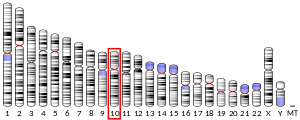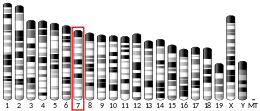PAOX
Peroxisomal N(1)-acetyl-spermine/spermidine oxidase is an enzyme that in humans is encoded by the PAOX gene.[5][6]
References
- 1 2 3 GRCh38: Ensembl release 89: ENSG00000148832 - Ensembl, May 2017
- 1 2 3 GRCm38: Ensembl release 89: ENSMUSG00000025464 - Ensembl, May 2017
- ↑ "Human PubMed Reference:".
- ↑ "Mouse PubMed Reference:".
- ↑ Wu T, Yankovskaya V, McIntire WS (Jun 2003). "Cloning, sequencing, and heterologous expression of the murine peroxisomal flavoprotein, N1-acetylated polyamine oxidase". J Biol Chem. 278 (23): 20514–25. doi:10.1074/jbc.M302149200. PMID 12660232.
- ↑ "Entrez Gene: PAOX polyamine oxidase (exo-N4-amino)".
Further reading
- Järvinen A, Keinänen TA, Grigorenko NA, et al. (2006). "Guide molecule-driven stereospecific degradation of alpha-methylpolyamines by polyamine oxidase". J. Biol. Chem. 281 (8): 4589–95. doi:10.1074/jbc.M509959200. PMID 16354669.
- Pledgie A, Huang Y, Hacker A, et al. (2006). "Spermine oxidase SMO(PAOh1), Not N1-acetylpolyamine oxidase PAO, is the primary source of cytotoxic H2O2 in polyamine analogue-treated human breast cancer cell lines". J. Biol. Chem. 280 (48): 39843–51. doi:10.1074/jbc.M508177200. PMID 16207710.
- Gerhard DS, Wagner L, Feingold EA, et al. (2004). "The status, quality, and expansion of the NIH full-length cDNA project: the Mammalian Gene Collection (MGC)". Genome Res. 14 (10B): 2121–7. doi:10.1101/gr.2596504. PMC 528928. PMID 15489334.
- Ota T, Suzuki Y, Nishikawa T, et al. (2004). "Complete sequencing and characterization of 21,243 full-length human cDNAs". Nat. Genet. 36 (1): 40–5. doi:10.1038/ng1285. PMID 14702039.
- Clark HF, Gurney AL, Abaya E, et al. (2003). "The secreted protein discovery initiative (SPDI), a large-scale effort to identify novel human secreted and transmembrane proteins: a bioinformatics assessment". Genome Res. 13 (10): 2265–70. doi:10.1101/gr.1293003. PMC 403697. PMID 12975309.
- Strausberg RL, Feingold EA, Grouse LH, et al. (2003). "Generation and initial analysis of more than 15,000 full-length human and mouse cDNA sequences". Proc. Natl. Acad. Sci. U.S.A. 99 (26): 16899–903. doi:10.1073/pnas.242603899. PMC 139241. PMID 12477932.
- Vujcic S, Liang P, Diegelman P, et al. (2003). "Genomic identification and biochemical characterization of the mammalian polyamine oxidase involved in polyamine back-conversion". Biochem. J. 370 (Pt 1): 19–28. doi:10.1042/BJ20021779. PMC 1223169. PMID 12477380.
This article is issued from
Wikipedia.
The text is licensed under Creative Commons - Attribution - Sharealike.
Additional terms may apply for the media files.





